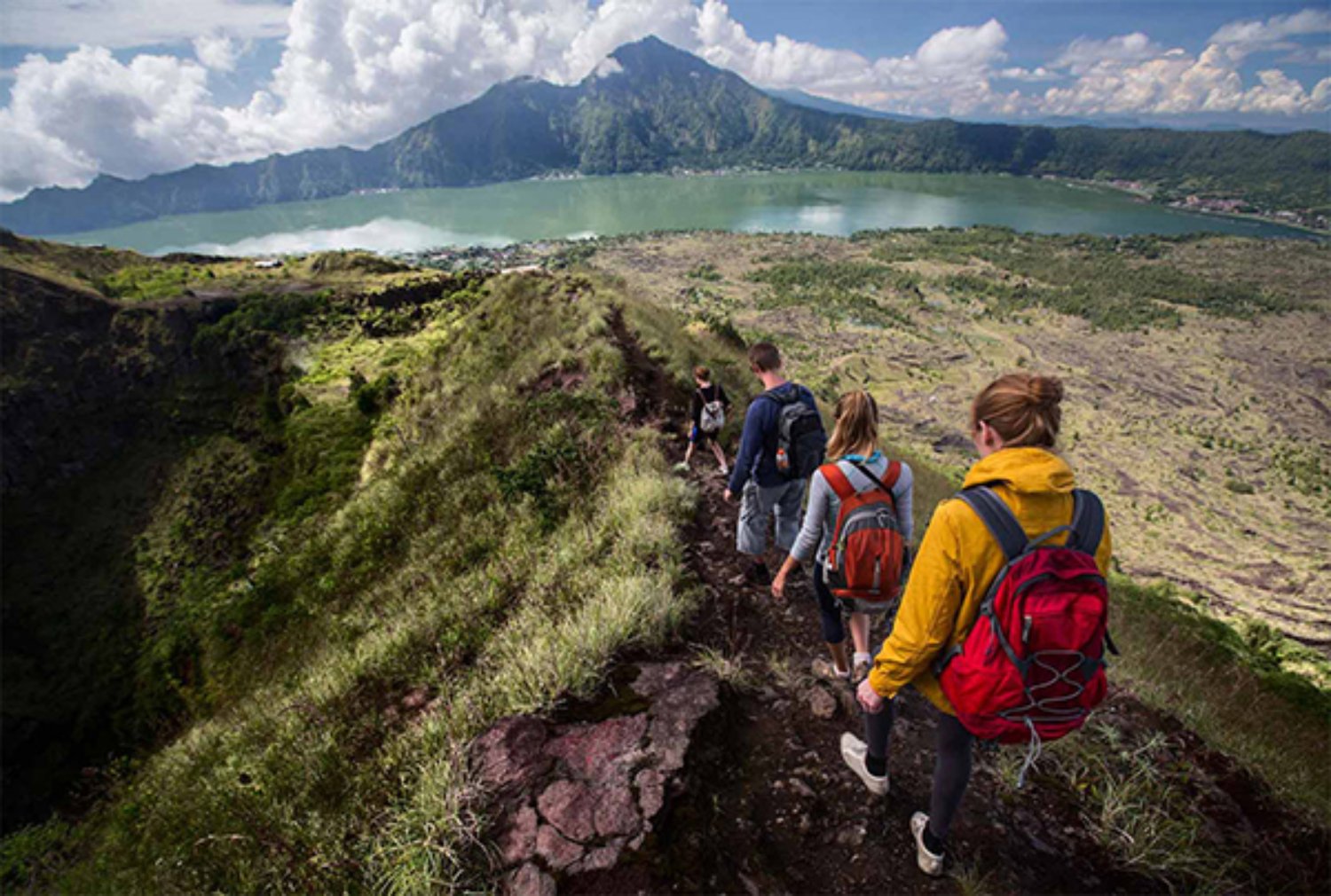Curious about Bali? This Indonesian gem is renowned for its breathtaking landscapes, unique culture, and exciting adventures. In our guide, you’ll find travel tips, cultural highlights, and must-see attractions.
Key Takeaways
- Bali’s culture is deeply influenced by Balinese Hinduism, with over 20,000 temples playing a central role in community life and traditions.
- Navigating Bali requires awareness of the Tourist Tax and local transportation options, including renting scooters or using ride-hailing services.
- Sustainable tourism initiatives are prioritizing environmental protection and local community support, with programs aimed at preserving Bali’s natural beauty and cultural heritage.
Discover Bali’s Unique Culture
Bali’s culture is deeply rooted in Balinese Hinduism, known as Agama Hindu Dharma. It shapes daily lives and rituals, creating a tapestry of traditions and beliefs that are both fascinating and inspiring. Central to this is the philosophy of Tri Hita Karana, promoting harmony among God, people, and nature. This philosophy influences every aspect of Balinese life, from architecture and art to community ceremonies.
The island is home to over 20,000 Hindu temples, each serving specific functions and hosting rituals throughout the year. These temples are not just places of worship but also community hubs where significant life events such as births, marriages, and important festivals are celebrated, making it one of the world’s most vibrant cultural landscapes, surrounded by a true paradise. Religion plays a vital role in this cultural tapestry.
Ceremonial offerings, known as sesajen, are among the most captivating aspects of Balinese culture. Composed of local agricultural products, these offerings are central to Balinese spirituality and can be seen adorning temples, homes, and even street corners.
Visitors are drawn to visit Bali not only for its natural beauty but also for its unique customs and religious practices. The island’s rich heritage and spiritual depth offer a connection that many travelers seek. Whether exploring the bustling markets of Ubud or witnessing a traditional dance performance in Kuta, the essence of Bali’s culture is palpable and unforgettable.
Navigating Bali: Essential Travel Tips
Navigating Bali can seem daunting, but a few travel tips will make your journey smooth and enjoyable. Be aware of the Tourist Tax, which costs IDR 150,000 and applies to all international visitors. This tax can be paid online or upon arrival at designated counters, but paying online before arrival is advisable to avoid complications.
You might not be checked for tax payment at immigration, but retaining proof of payment is crucial. There are exemptions for holders of diplomatic visas and certain other special visa types. Being prepared and informed allows you to focus on enjoying your trip without unexpected hiccups.
Where to Stay in Bali
Bali offers a wide range of accommodation options to suit every traveler’s needs. For a luxurious experience, consider upscale resorts in areas like Uluwatu, ideal for a traditional resort atmosphere. Ubud also offers unique luxury stays, including resorts with private pools and wellness services, perfect for a relaxing retreat.
For vibrant nightlife and beach activities, Kuta is a bustling area favored by younger travelers. Canggu offers a more laid-back atmosphere with its surf culture and beach clubs, popular for those seeking a relaxed vibe. Families might prefer the quieter beaches of Sanur, which offer a good selection of local eateries.
Budget travelers will find many affordable options in Ubud, including hotel guesthouses with stunning rainforest views and pools. Bali’s diverse accommodations ensure you will find the perfect place to rest and rejuvenate.
Must-Visit Attractions in Bali
Bali island is a treasure trove of attractions showcasing its rich culture and natural beauty. The island is dotted with iconic temples reflecting its spiritual heritage and architectural grandeur. From the breathtaking cliffside Uluwatu Temple to the serene waters of Ulun Danu Beratan Temple, these sacred sites testify to Bali’s deep-rooted spirituality.
Besides its temples, Bali’s central mountains offer stunning viewpoints and lush landscapes. Mount Agung, the island’s highest peak and one of the active volcanoes, draws visitors for both its challenging hikes and spiritual significance. Whether exploring the temples or trekking through the mountains, these attractions provide a glimpse into the heart and soul of Bali.
Iconic Temples
Tanah Lot is one of Bali’s most iconic temples, built in the 16th century and dedicated to the sea god. Renowned for its dramatic coastal views, it plays a central role in Balinese mythology. Its stunning setting along the coastline makes Tanah Lot a favorite among tourists.
The temple’s historical significance and breathtaking location make it perfect for photography, especially during sunset when the temple is silhouetted against the vibrant sky. Visiting Tanah Lot offers a unique glimpse into Bali’s spiritual and cultural heritage.
Central Mountains
Bali’s central mountains are a haven for nature lovers and adventurers. Mount Agung, standing at 10,308 feet, is the island’s highest point and offers challenging hikes with rewarding panoramic views. The region provides scenic viewpoints capturing the island’s diverse landscapes, from lush forests to terraced rice paddies.
These mountains are ideal for photography, with stunning vistas and serene beauty. Whether trekking through lush landscapes or soaking in the views, Bali’s central mountains and central bali offer a peaceful escape from bustling coastal areas in the south and north.
Bali’s Tropical Climate
Bali’s tropical climate is one of its many charms, attracting visitors year-round with warm and humid weather. The island has two distinct seasons: the dry season from April to October and the wet season from November to March. The dry season is particularly favored for outdoor activities due to its predictable and pleasant weather.
Daytime temperatures during the dry season are ideal for exploring Bali’s beaches, temples, and mountains during peak season. Even in the wet season, rain typically comes in short bursts, allowing plenty of opportunities to enjoy the island’s natural beauty.
Whether you prefer the sunny days of the dry season or the lush greenery of the rainy season, Bali’s climate ensures a delightful experience year-round.
Getting Around Bali
Despite its small size, traveling around Bali can take longer than expected due to winding roads and traffic. Renting a scooter is one of the most popular and cost-effective ways to explore Bali, with daily rates typically ranging from IDR 80,000 to 150,000. Scooters offer the flexibility to navigate efficiently, especially for those on a tight schedule.
For those who prefer not to drive, ride-hailing services like Grab and Gojek provide convenient transportation options, including motorcycles and cars. These widely available services can be a lifesaver for navigating Bali’s busy streets.
While public buses operate in Bali, they are limited and generally not favored by tourists due to slow service and infrequent schedules. Choosing the right mode of transportation allows you to make the most of your trip and explore Bali’s many attractions at your own pace.
Culinary Delights of Bali
Bali’s culinary scene is a feast for the senses, offering a vibrant array of dishes reflecting the island’s rich agricultural heritage and cultural traditions in Indonesia. One popular dish is Nasi Goreng, or fried rice, typically served with vegetables or chicken. Another favorite is Kare, a coconut curry that comes in various forms, often including meat or vegetables.
For a diverse palate, try Nasi Campur, a mixed dish that includes rice paired with various side items such as sate lilit and vegetables. Appetizers like Lumpia rolls, similar to spring rolls, and Sayur urap, cooked vegetables mixed with grated coconut, are also delightful options.
No meal in Bali is complete without indulging in Pisang Goreng, or fried bananas, often drizzled with honey or sugar for a sweet finish. Whether dining in upscale restaurants or enjoying street food, Bali’s cuisine offers a delicious journey through the island’s flavors.
Adventure Activities in Bali
For adventure seekers, Bali offers a plethora of activities catering to all levels of thrill. Uluwatu is known for its challenging surf breaks, making it a favorite among experienced surfers, especially between April and October when conditions are ideal. For water-based adventures, white-water rafting on the Ayung River and the Telaga Waja River provides an exhilarating experience.
Hiking enthusiasts can trek up Mount Batur for stunning sunrise views, an experience that typically requires a guide for safety and enhanced enjoyment. Bali’s waterfalls, such as Sekumpul and Tukad Cepung, offer scenic hikes and breathtaking views, perfect for nature lovers.
Scuba diving is another popular activity, with Nusa Penida being a prime location known for its manta rays and clear waters. Whether surfing, rafting, hiking, or diving, Bali’s adventure activities promise an unforgettable experience.
Shopping in Bali
Shopping in Bali is a vibrant experience, allowing visitors to find unique souvenirs and local crafts reflecting the island’s culture. The Ubud Art Market offers authentic Balinese crafts, including textiles and sculptures, making it a great place to pick up memorable keepsakes. For budget-friendly options, the Kuta Art Market offers a variety of souvenirs like batik clothing and accessories.
Sukawati Art Market, one of Bali’s oldest markets, is famous for traditional crafts and competitive prices. Pasar Badung in Denpasar, Bali’s largest traditional market, is known for fresh produce and local handmade crafts, including items inspired by Sumatra.
The Seminyak Flea Market offers a more modern shopping experience with stylish clothing and handmade jewelry. Whether looking for traditional crafts or modern fashion, Bali’s markets provide a treasure trove of shopping opportunities catering to all tastes and budgets.
Health and Safety in Bali
Health and safety are paramount when visiting Bali. Here are some key considerations:
- The island has a history of volcanic activity, so travelers should stay informed about potential eruptions and earthquake risks.
- ‘Bali Belly’ (food poisoning) is a concern, emphasizing the importance of drinking safe, clean water.
- Be cautious with street food to avoid food-related illnesses.
By keeping these points in mind, you can ensure a safer experience while enjoying your time in Bali.
Travelers should avoid engaging with local monkeys, as they can be aggressive and prone to stealing belongings. Women should avoid traveling alone at night or in secluded areas to mitigate safety risks. While Bali is welcoming to LGBTQ travelers, maintaining a low profile is recommended due to shifting societal attitudes.
Sustainable Tourism in Bali
Sustainable tourism is becoming increasingly important in Bali as the island strives to preserve its natural beauty and cultural heritage. The revenue from the Bali Tourist Tax is used to support cultural preservation and environmental protection initiatives. Local programs aim to connect hotels with local farmers, ensuring fair practices and supporting the agricultural community.
One such initiative is Eco Tourism Bali, which has facilitated significant transactions to support local farmers in the last two years. Additionally, the island is home to a regenerative program focused on environmental sustainability through activities like mangrove and coral planting. This commitment to sustainability is further seen in eco-friendly luxury accommodations like Blossom Eco Luxe Villas in Canggu.
Bicycles are also available for rent in quieter areas, making them an eco-friendly option for leisurely exploration. The Eco Climate Badge program recognizes businesses that adhere to sustainability standards, including waste reduction and energy efficiency, encouraging a greener approach to tourism. By choosing sustainable options, travelers can help protect Bali’s environment and support its local communities.
Planning Your Itinerary
Planning your itinerary in Bali depends on the length of your stay and the experiences you seek. For first-time visitors, a one-week stay is suggested to cover key highlights like Canggu and Ubud. These areas provide a good mix of cultural experiences and natural beauty, offering a comprehensive introduction to the island.
For a more immersive experience, consider a two-week itinerary that includes exploring various regions such as Ubud, Sideman, and Uluwatu. This allows travelers to delve deeper into Bali’s diverse landscapes and cultural sites. Longer stays of three weeks or more provide the opportunity for day trips to nearby Indonesian islands such as Nusa Penida and the Gili Islands, offering a broader perspective of the Indonesian archipelago.
To navigate the island efficiently, private drivers are available for hire, often acting as informal guides and providing flexibility for visiting multiple destinations located on the island in June. Shuttle buses are a budget-friendly option for intercity travel but usually require advance booking due to set schedules.
With various itinerary suggestions, travelers can tailor their trip to match their interests and time frame, ensuring a fulfilling and memorable experience at the destination in the world and across countries.
Summary
Bali is a destination that offers something for every traveler, from its rich cultural heritage and iconic temples to its adventure activities and culinary delights. Understanding the island’s unique culture and navigating it with essential travel tips can enhance your experience, allowing you to immerse yourself fully in what Bali has to offer.
By planning your itinerary carefully, choosing sustainable options, and being mindful of health and safety, you can ensure a safe and enjoyable trip. Whether you’re seeking relaxation, adventure, or cultural exploration, Bali promises an unforgettable journey. So, get ready to pack your bags and create memories that will last a lifetime in this island paradise.
Frequently Asked Questions
- What is the Bali Tourist Tax and how much does it cost?
The Bali Tourist Tax is IDR 150,000 and applies to all international visitors. This fee can be conveniently paid online or at designated counters upon arrival.
- What are the best places to stay in Bali for luxury and budget travelers?
For luxury travelers, upscale resorts in Uluwatu and Ubud offer exceptional experiences, while budget travelers should explore affordable guesthouses in Ubud that provide beautiful views.
- What are some must-visit attractions in Bali?
You should definitely visit iconic temples such as Tanah Lot and Uluwatu, along with exploring the stunning central mountains, including Mount Agung, for a truly memorable experience in Bali.
- What are some popular dishes in Balinese cuisine?
Balinese cuisine features popular dishes such as Nasi Goreng, Nasi Campur, and Lumpia rolls, alongside Kare, Sayur Urap, and the sweet treat Pisang Goreng for dessert. These dishes showcase the rich and diverse flavors of the region.
- How can travelers contribute to sustainable tourism in Bali?
Travelers can significantly contribute to sustainable tourism in Bali by paying the Bali Tourist Tax, opting for eco-friendly accommodations, supporting local farmers, and engaging in activities like mangrove planting. Taking these steps helps preserve Bali’s environment and supports its local communities.










